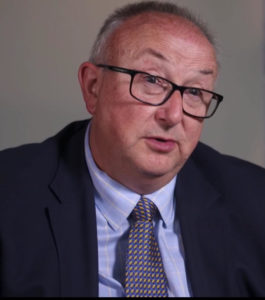 Today I’m thrilled to share an interview with Colin Sutton with you. In case you don’t recognise the name read on and let him introduce himself and I’m sure you will soon know who I have invited onto the blog. I feel very honoured that he accepted my invitation to do the interview. The answers to my questions are very insightful. I do hope you enjoy this as much as I did.
Today I’m thrilled to share an interview with Colin Sutton with you. In case you don’t recognise the name read on and let him introduce himself and I’m sure you will soon know who I have invited onto the blog. I feel very honoured that he accepted my invitation to do the interview. The answers to my questions are very insightful. I do hope you enjoy this as much as I did.
Hi Colin, thank you for coming on to the blog to talk to me and my readers.
First of all, can you give the readers a little overview of who you are and what you may have done in your life if they don’t already recognise your name?
I’m Colin Sutton, I was a police officer for thirty years (but not one second more) and spent the last nine years of that as a Detective Chief Inspector, leading a murder squad in London. Since I retired I have been appearing as a crime pundit on TV and radio, writing short pieces for newspapers and also, now, writing some longer stuff.
How long have you been retired from the job and do you miss it
I retired in January 2011 so around eight years ago. I very occasionally miss the job; more often I miss certain individuals I worked with. But my life has gone in incredible and unexpected directions since then and I am very grateful for that.
What did you love most about being part of the police service?
On a personal level I guess belonging to a team, having people I could trust and who trusted me were things I cherished. Ultimately though I knew I was doing an essential job and making a difference to individuals who needed it.
I found after I left the police that I had a lot of dreams to do with my life while I was there. It’s not your typical nine to five job that you walk away from, how have you found adjusting to civilian life?
I was unusual in that I never really bought into the ‘police is your life’ culture – for example, my four best friends still are from my schooldays. I think I always had the ability to compartmentalise work and home and so retiring just meant home took over. I found (find) a wonderful freedom to explore new ideas and projects which, quite honestly, I had neither the time nor the enthusiasm for when I was working.
You wrote a book, Manhunt, that has done incredibly well. We have a lot of fiction writers here, but yours was non-fiction. What made you decide to write it?
I wanted to tell the story of the investigation, of my team, their dedication, passion and skill. Ordinary people doing an extraordinary job. I knew there was a lot of interest in Levi Bellfield – as there is in all serial killers – but I wanted to try to show what it is like chasing one. I hoped to inform, to showcase, to reassure the public that coppers do care and also, if possible, to inspire younger officers.
Tell us how you approached writing that first draft?
I had a lot of notes and so much of the material was indelibly etched in my brain – I had read the whole case papers three times of course. But I didn’t want just to regurgitate facts. So I read a lot of detective fiction, especially those that are technically accurate like Mark Billingham’s. Then I read some online stuff about how to write fiction. I had the idea that, if the book were to stand out it needed to be more than just an accurate account, it needed to have a story and a structure akin to a novel. I’m not sure how far I succeeded in this though… [It is an interesting notion to me – how far should a true crime book mimic fiction? Especially as, once I get the next two planned true crime books done there is a novel I am itching to get on with.]
Did you find it brought up emotions from the case while you were writing and how did you deal with this?
Some parts did – the scene where I went to visit Amélie Delagrange’s parent always brings me to tears, just remembering how hard it was and their remarkable decency and stoicism. And writing the pen pictures of the victims was especially hard. But I also found myself moved as I recalled some of my team and their individual acts of heroism.
Were there any rituals you had to do or items you must have had with you while writing that draft?
Not really but I did find that the most productive days started at 0730 rather than at 1030. And Pepsi Max, lots of Pepsi Max.
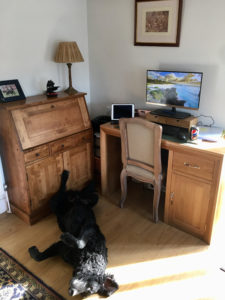 What does your workspace look like?
What does your workspace look like?
Although I do have an office I prefer to work in ‘my’ corner of the living room with a desk, computer, printer and a bureau. There is more space there and I have the company of the dogs too. I am a news junkie and have some talk radio station on most of the time.
Did the outside world exist or were you lost to us for a period of time as the magic worked?
I am lost to the world while I am writing, then the postman comes and the dogs bark and I am brought back. I have a watch that tells me every hour if I haven’t moved and so get up and have a quick wander around, then usually by 2 or 3 o’clock the dogs tell me when I have done enough and it is time for a proper walk. It is a lovely working environment. I rarely if ever write when my wife is at home, that isn’t work time.
How long did it take to write the first draft?
From start to finish it was nine years, but obviously not full-time! I wrote the first 15,000 or so words quite quickly, then decided it wasn’t any good, nobody would want to read it and stopped. It was only when the wonderful screenwriter Ed Whitmore saw what I had done and encouraged me to continue that I took it up again after about four years of inactivity.
Do you prefer to write the first draft or do you prefer the revision process?
Most definitely the first draft; I revise as I go along, chapter by chapter.
After you’ve written the first draft, how messy is the revision process – can you go in and repair areas or does the whole manuscript get decimated?
I think I don’t really notice the revisions too much since by the time I move on to the next chapter I am pretty happy with it. I didn’t have to make wholesale changes at any point, so it was always just a matter of quick repairs. One of the things about the whole process which surprised me was just how little editing I had to do after I had submitted the final draft. I am sure I just got lucky and it won’t always be like that.
What do you drink while you’re working?
First drink of the day is black coffee, then Pepsi Max and lastly a cup of tea when I stop writing.
At what stage was a publisher interested in the manuscript?
I had an unusual journey. I was advising Ed Whitmore on a BBC crime drama (which was never made) and he read my first 15,000 words. He told me to carry on and initially I ignored him. Then out of the blue he called me to say that he hoped I didn’t mind (er, yeah, like I would!) but he had shown what then existed of my book to a TV company – and that they wanted to speak to me about optioning the book on the basis of what they had read.
That TV company was Buffalo Pictures and within a few weeks they had indeed optioned it. From there Ed came to stay with me for a week and we produced the script for the first episode, which was the basis for ITV commissioning the drama. At that point he had a script to write from a book which I had yet to complete, so I thought I’d best get on with it.
That was when I went to an agent (the fabulous Robin Wade, recommended by my good friend and author Anthony Riches) and he tells me it wasn’t too difficult to interest publishers with the book given the opportunity to coincide publication with a major TV series. As I said, I have been extremely fortunate, I do appreciate that things fell into my lap unusually easily and that I haven’t had to suffer the rejections and slog that so many find come with their first book.
Manhunt has recently been on our television screens. I personally loved it. It showed policing in the most realistic light I have ever seen it. Did you have much input into the show?
I’m glad you liked it! Yes, I had input at every stage, from the writing to the set-dressing to the shooting. Buffalo were incredibly accommodating of my desire to make it as authentic as possible, they totally bought in to the premise that it was the authenticity which would make it strong. Ed was a genius, he took the scenes from my book and, with very little tweaking and just a touch of re-ordering, created a drama which gripped through its pace and realism rather than sensational fights and car-chases. And which paid very little attention to the vile man we were seeking. The police scenes were very, very accurate – as evidenced when you compare them to the book. Some of the domestic stuff was a little more ‘creative’ – ITV felt it needed it. I was content with that – for me the important thing was to get the investigation portrayed as authentically as possible. We are very proud of what we achieved – and of the reaction to it. We never dreamed it would be the most-watched ITV drama for six years.
What’s next for you? Will you be writing anything else? Do you fancy dipping your toe into fiction maybe or do you have more non-fiction tales to tell?
I have started on another true crime story and we have pitched it and one other to the publishers, so fingers crossed they will want them. I have made a start on a novel (which I enjoy writing very much – the liberation, the ability to wander off piste, is very refreshing after true stories) but that is very much a slow-burner. It started off as a crime story but the more I write I realise it really deals with people, their lives and how they relate to one another. Which I suppose, ultimately, is what any story is about?
Thank you so much for taking the time to answer these questions. It’s been an utter pleasure having you on the blog.
You can find Colin on Amazon and Twitter
Manhunt
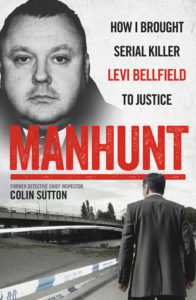 NOW A MAJOR TV DRAMA STARRING MARTIN CLUNES
NOW A MAJOR TV DRAMA STARRING MARTIN CLUNES
What does it take to catch one of Britain’s most feared killers?
Levi Bellfield is one of the most notorious British serial killers of the last fifty years – his name alone evokes horror and revulsion, after his string of brutal murders in the early 2000s.
At 3:07pm on 21st March, 2002, Milly Dowler left her school in Surrey for the last time. Less than an hour later, she was to be abducted and murdered in the cruellest fashion, sparking a missing person investigation that would span months before her body was found.
In the two years that followed, two more young women – Marsha McDonnell and then Amélie Delagrange – were murdered in unspeakably brutal attacks.
Yet with three murdered women on their hands, and few leads open to them, investigating officers were running out of ideas and options, until SIO Colin Sutton was drafted into the investigation for the murder of Delagrange. Seeing a connection between the three women, and thriving under the pressure of a serial killer hunt, Sutton was finally able to bring their murderer to justice after the case had begun to seem hopeless.
Manhunt tells the story of how he led the charge to find a mystery killer, against the clock and against the odds – day by day and lead by lead. At once a gripping police procedural, and an insight into the life of an evil man, this is the story behind what it takes to track down a shockingly violent murderer before he strikes again.

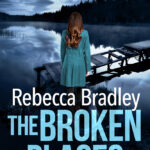
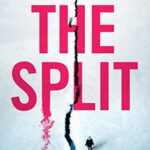
Fascinating. I watched the programme ‘Manhunt’ and was gripped.Colin restores your faith in the ‘system’.
Yes, it was a great programme wasn’t it and I loved Colin’s work ethic. One of the reasons I tracked him down on social media and asked him to do this interview. So glad you enjoyed it.
What a fascinating interview! Thank you, both. And so much richness to bring to the novel-writing process, too…
Glad you enjoyed the interview, Margot. I was so pleased that Colin agreed to do it.
Excellent work ethic. Dixon of Dock Green would of given the big thumbs up. Twenty six thousand? White Ford vans, a daunting figure but only about half of the tread pattern in the case of The Yorkshire Ripper.
I don’t think that in the future when I go past a bus stop and see young girls or young woman especially with blonde hair will I not get a sickness of that man. Well done Colin Sutton.